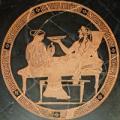44 - The Goldilocks Theory: Aristotle's Ethics
Posted on
Peter looks at one of Aristotle’s most popular works, the Nicomachean Ethics, and its ideas about happiness and virtue.
Themes:
Further Reading
• D. Bostock, Aristotle’s Ethics (Oxford: 2000).
• S. Broadie, Ethics with Aristotle (Oxford: 1991).
• J.M. Cooper, Reason and Human Good in Aristotle (Cambridge, MA: 1975).
• C. Rapp, "What Use is Aristotle's Doctrine of the Mean?" in B. Reis and S. Haffmanns (eds), The Virtuous Life in Greek Ethics (Cambridge: 2006), 99-126.
• A.O. Rorty, Essays on Aristotle’s Ethics (Berkeley: 1980).
• J.O. Urmson, Aristotle’s Ethics (Oxford: 1988).

Aristotle


 ..
..



Comments
I don't understand :(
I don't *get* what an Aristotilian virtue is - other than that virtuous people instinctively do good things because it makes them happy, and that these tend to be somewhere between too much and too little of two extremes. Isn't that a circular argument?
Also I don't understand how this doesn't just come down to perception. Virtuous and wise person X might show many virtues in his dealings with his community, which generally makes him happy. But what if X is living in an unvirtuous community (say that requires the life and death of slaves to function)? Is X virtuous or not? Can X really experience, even if he is not aware of the unjustice on which his life is built? Can his love and service of community be both a virtue and a vice at the same time?
In reply to I don't understand :( by joe
Aristotle's virtue
Hi there,
I might have said in the episode that Aristotle is more trying to analyze what virtue is than telling us how to be virtuous, or what virtue "looks like" (if we are well-brought-up we should be able to recognize virtuous actions and see examples of them). And he's telling us at least two significant things we might not have noticed, namely that virtue is (a) a disposition, i.e. a tendency to do a certain kind of thing in a certain kind of situation; and (b) specifically a disposition to spot and then choose the mean between extremes. Neither of these points is circular and both are controversial (when Aristotle considers other contenders he says that others have said that virtue is perhaps knowledge -- as Socrates said -- or that it is a god-given inspiration; these would be very different from the "disposition" view).
And then you are right that it has a lot to do with perception. As I say virtue involves discerning what the right/mean-between-extremes choice would be. But what that leaves out is that the virtuous person will want to do the right thing, s/he will enjoy doing it and do so out of habit, etc. This is what distinguishes virtue from mere self-control (enkrateia: where I want to do the wrong thing but force myself to act rightly).
Does that help?
Peter
In reply to Aristotle's virtue by Peter Adamson
political science
Thanks for this, Peter. I guess I see it as circular because if you don't have any objective standards for behaviour, then the only reason you know adultery is bad is because good (well trained, virtuous, middle aged) people don't do it.
I was listening to Dominic Scott on one of the next podcasts, and you and he were talking about the beginning of the Ethics and the emphasis on political science in Book 1 Ch 2.
I think maybe this begins to pull things together - maybe this is addressed to a Platonic aristocratic group of people trained/in training for leadership. Maybe the idea is to tell these people to believe that their good training and instruction has impacted on their 'state of being' and that they can trust in their own instincts rather than grasping towards some Platonic perfection. As I was reading it again, I was thinking of it as a kind of ancient version of the Kipling poem 'If' - apparently with the idea that if you give someone a few general boundaries and a bit-of-a-nudge, they'll end up a Man, owning all the Earth, and happy.
My criticism is that nobody can ever discern "what the right/mean-between-extremes choice would be" because there will always be further levels of complexity beyond that which they perceive - I'm not sure you (one in general) can ever tell whether any action is really virtuous. What about the person who has had all the same training and life experience but goes on to do the things Aristotle describes as vices? Are they not suddenly to be considered virtues because the virtuous person is doing them?
In reply to political science by joe
Ethics and politics
Yes, that is a very good point - we might think that (part of) what Aristotle is doing in the Ethics is giving guidance -- maybe to current or potential politicians -- about how to organize society such that people will become virtuous, where we all know what sorts of actions count as virtuous but don't understand it in analytical detail.
Regarding your last point, more generally I think that ethical theories can serve different purposes. In some cases moral theorists want to build morality from the ground up, like Kant's categorical imperative -- so that if you started as it were with a blank piece of paper and the rules of reason, you could work out what is right and what is wrong. But other moral theorists, like Aristotle, accept that people generally have pretty good ethical instincts or beliefs and are offering something different, namely a systematization or explanation of those beliefs. On behalf of this approach I'd point out that if a theory "started from scratch" and then in the end told you for instance that it is morally ok to torture the innocent for no good reason, then you would immediately reject the theory without bothering to look at the details. So all moral theory needs to answer to our moral intutions. The only question is what role they play -- do you start from them and build up, or instead use them as a check on some kind of abstract construction? (Of course even if you start with the intuitions, as Aristotle does, you might be able to correct or refine the intuitions in light of the consistent and worked-out theory that you arrive at - we don't need to say that all moral intuitions are always correct, or deny that there are hard cases where our intuitions fail us.)
In light of this, I think to your last point Aristotle would just say that well-raised people do perceive the mean and choose it gladly, so the possibility of managing this is not open to question -- we see it happen all the time (any time we think of an action we admire morally). The question is how they are doing it, and how to go about raising people to act like that and not viciously. Your objection only arises if we take seriously a more aggressive moral skepticism which threatens to throw all our moral intuitions out of the window, demanding that we start with the blank piece of paper. I think Aristotle would probably say, "why would you think that is a good way to do moral theory?" And to be honest I think he's right!
In reply to Ethics and politics by Peter Adamson
thanks
I've not yet tried to grapple with Kant. I guess I just see people as a mix of different things and motives and morals. Generally I think that even when we try to do things 'for the right motives' it can be said on a different scale/level to be morally wrong. Working to feed our children might be clearly said to be a virtue, but what if that excludes other children? What if other children have had to die in order for us to have the lifestyle we enjoy? And so on.
And the notion that well-raised people are more moral than others seems to fly in the face of experience. Well raised people are just immoral in different ways.
Anyway, I appreciate the discussion, I've found it hard to find anyone who can talk to me about Aristotle, so thanks for your time again.
In reply to I don't understand :( by joe
Virtuous or not?
What awesome questions. Something that stuck out to me was the statement you made about isn’t it all about perception. Now I am not a master theologian, so bear with me. But I believe that the subject matter in your question exposes the problem. If it is left to you or me alone to decide we risk the enourmous probability of a biased decision. Where the only rational position I must rely on, (if we had one, and I believe we do) is to find a source that is transcendent. Now in reference to your last question pertaining to if perception is the determiner of what is virtuous or not we will see that the world virtuous itself is trancendant by definition alone. But when we allow our perception to determine these matters we will see a broad spectrum of misinterpretation when discussing the matter of what is virtuous or not from solely a definitional standpoint. This in not to say that there are not other ways I may have overlooked to validate my position.
Hope to have been even a smigget of benefit to your question.
daprof!
Hi Peter and anyone else
Hi Peter and anyone else reading!
I find it kind of funny, given that one of the main criticisms of Aristotle's natural science is that it's too teleological, that I wish there were more of a teleological emphasis in his Ethics and Politics. It seems like, for someone like Aristotle who believes that things like humans and states have "final causes," the natural way to do ethics or politics would be to figure out (1) what that end is, then (2) what kind of person or state best conduces to that end, then (3) how best to intervene in politics or education so as to train up/construct just such a person or state as that.
Instead, in the ethics he really only gets around to explaining what he thinks is the final end of human beings (thinking, more precisely theoretical speculation) in the last book. And when he does, his arguments seem rather flimsy to me.
First, he says that the final cause of an organism will be its distinctive action. Since humans are the only rational animals, our purpose must be the exercise of this faculty. But wouldn't this same argument prove that spiders' purpose is to spin webs, bats' purpose is to hang upside down in caves, and so on? This seems to run counter to Aristotle's own claim in the Politics (1.8) that the final cause of all non-human animals is to be useful to humans, and the suggestion in the Metaphysics that animals and plants aim at imitating the immortality of God by maintaining their species through reproduction, so their final cause would be that.
A second argument for thinking being humans' final cause is that all other actions have an end outside themselves: one does not go to war for the sake of going to war, build a house for the sake of building a house, etc. Thinking is the lone exception, an end in itself. But this does not seem self-evident to me. When I think about my own thinking, it seems I am always aiming at some end, whether it is to decide what to do, what is true (either in general or in a particular case), or merely to entertain myself. Aristotle seems to have in mind the kind of deep metaphysical speculation on display in his Metaphysics. But, having followed A's train of thought there and concluded with him that God is the primary substance, etc., would one really want to go back to the first principles and follow the argument to the conclusion a second and third time, and on and on forever, if one did not doubt the conclusion or the proof? This seems absurd.
In reply to Hi Peter and anyone else by Kenneth Connally
Teleology in Aristotle's ethics
Thanks for these interesting comments. I think both objections are potentially powerful ones and it will take some doing for Aristotle to answer them. Here's a start on some responses:
1. Your first objection is often raised against the function argument, and I like your examples: if only spiders spin webs, then is that their final end? He could however reply that the web-spinning is indeed intimately related to their final end, namely to flourish and reproduce by (among other things) catching prey and eating them in the way that spiders do. Thus the web-spinning might be part of the complex activity that represents their final end, the way that thinking about (say) the four elements is something only we do, so it is part of our final end but not the whole final end.
2. On the second objection, firstly let me point out that you're assuming that the end of contemplation trumps the ends of practical virtue which take up most of Aristotle's attention in the first 9 of the 10 books. Some interpreters agree with you on this, others don't. If we don't assume this, then the final end involves not just contemplation but a life of politically engaged virtue, so it's not something you can just do and then stop. What about thinking itself though? Here I agree there is a puzzle about what you do once you have already "figured out" the objects of contemplation; do you have to keep re-visiting and topping up your contemplation to be fully active, and if so isn't that kind of pointless? Maybe it is enough to perfect the intellect at the level of first actuality (i.e. I have the knowledge and can use it whenever I want). In real life though, I guess that Aristotle would in any case not worry that one will run out of things to contemplate: he isn't only talking about metaphysics but also biology and all the other things to which he devoted his attention. So there is really no reason to think one will one day have to retire, having effectively achieved omniscience.
In reply to Teleology in Aristotle's ethics by Peter Adamson
Thanks for the response Peter
Thanks for the response Peter!
My second objection wasn't that one would eventually run out of new things to discover through contemplation, though. My objection is that, just to the extent that thinking is goal-oriented, it fails to meet Aristotle's own criterion for being the best human activity. It does have an end outside itself: whatever knowledge one is trying to obtain. The only answer I could think for Aristotle to give was that while we do learn things through theoretical speculation, we do it for its own sake, not IN ORDER to get the knowledge. (This presumably is why he favors theoretical speculation over the kind of practical reasoning we do in daily life.) That's why I proposed the thought experiment of thinking through the Metaphysics ad infinitum: if Aristotle is right that thinking is its own end, this should seem like a worthwhile activity despite the fact that no knew knowledge is being gained after the first few (or few thousand) iterations.
Sorry my train of thought got so condensed there!
In reply to Thanks for the response Peter by Kenneth Connally
Thinking
Ok, I see. Well here it might be important that Aristotle thinks that thinking about X means the intellect's taking on the form of X, so as to become (formally) identical with its object. So there is a sense in which the objects it knows are not in fact external to it: when thinking intellectually, the soul is actually thinking about itself or becoming actual in a certain way. When you look at thinking like this it makes more sense to see it as self-directed and self-sufficient in itself.
Quick question about your Plato series.
Why did you skip Plato's Dialogue, the "Euthyphro"; and more specifically, why did you not emntion the so-called "Euthyphro Dilemna"?
In reply to Quick question about your Plato series. by Matthew Hill
Euthyphro
Well, it's a bit of a cliche to introduce Plato with the Euthyphro so I decided to do something more unusual and start with the Charmides and Euthydemus. I actually discuss the Euthyphro problem much later in the series, using it to introduce the Asharite divine command theory in episode 137.
Cannot play file
Dear Peter, somehow I cannot play this episode whatever I do. Has something gone wrong? Best,
In reply to Cannot play file by Joost
Ethics episode
Thanks for letting us know - should be fixed now.
impossibility of ethical choice in some situations
I wonder how to apply Aristotle's theory to the Manhattan Project. The choice seemed to be between stopping Hitler before he could make the bomb and win world domination, or stopping a project that would lead to the presence of a terrible evil in the world. There would seem to be no median in this case with every possible choice one that could be condemned on an ethical level. I wonder if there are quite a lot of choices that are similar: the development of AI, for example; the development of the internet (?); the invention of plastic, etc. A choice can seem ethical when it is made but turn out to be horrific in practice in the long run.
The ethical quandary we seem to have been in for a century at least is this: if anything can be done we must do it before some evil person does it. Therefore, if anything can be done, however evil it may be in consequence, we must do it. That way leads to extinction.
Add new comment